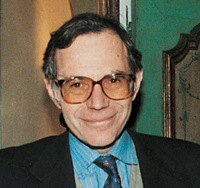|
|
 |
 |
 |
 |
|
AROUND THE QUADSALUMNI NEWSBUTLERRobert N. Butler ’49, a Pulitzer Prize-winning gerontologist whose pioneering career has been dedicated to enhancing the rights, needs and vitality of seniors, was selected to receive the Heinz Award for the Human Condition. The founding director of the National Institute on Aging (NIA) of the National Institutes of Health and the president/CEO of the International Longevity Center, Butler is among five eminent recipients of the $250,000 awards, presented in five categories by the Heinz Family Foundation in Pittsburgh. Butler, who has been battling discrimination against the elderly since the 1960s, is credited with coining the phrase “ageism.” In 1975, he published his Pulitzer-winning visionary work, Why Survive? Being Old in America (Johns Hopkins Press). A year later, he founded the NIA, where he oversaw in-depth research and data collection on the aging process and fostered the development of geriatric medicine. Expanding on his research, Butler founded the nation’s first department of geriatrics at Mount Sinai School of Medicine in 1982. Eight years later, he co-founded the International Longevity Center, an intercontinental nonprofit organization focused on helping societies address longevity and population aging. Last year, at the United Nations World Assembly on Aging, Butler’s paper, Declaration of the Rights of Older Persons, served as the framework for the conference’s final document. The Heinz Family Foundation recognizes individuals whose dedication, skill and generosity of spirit represent the best of the human condition. This year’s other Heinz Award recipients are August Wilson, Peggy M. Shepard, Julius B. Richmond and Robert S. Langer. The Chairman’s Medal is being awarded jointly to Senator Richard G. Lugar (R-Ind.) and Sam Nunn, co-chairman and CEO of the Nuclear Threat Initiative. ADELMANJonathan Adelman ’69, ’76 GSAS, professor of international studies at the University of Denver, spoke on February 4 about the Arab-Israeli conflict in its regional context at the annual Jacob and Anna Blauner Memorial Lecture at the Kraft Center. Adelman has spoken on more than 20 campuses and in a dozen foreign countries and has advised the Israeli foreign ministry on outreach to college campuses and the American media. He has taught in Israel at the Hebrew University and the University of Haifa. Adelman spoke of the “tragedy of economic and political backwardness in the Arab world” and noted that the failure of Arab nations to make the economic transformations that other countries such as China, South Korea and Singapore have achieved has led not only to poverty and unemployment but to jealousy over Israel’s relatively successful global transformation. He also spoke about the failure of the peace process, the rise in anti-Semitism worldwide and especially in Europe, and why Israel often is seen as a pariah in the world community. FONER
Eric Foner ’63, DeWitt Clinton Professor of History, was a commentator during PBS’s two-part American Experience documentary Reconstruction: The Second Civil War, which aired January 12–13. The program examined the period after the Civil War, as America struggled with how to rebuild, bring the South back into the Union and incorporate former slaves into the life of the country. He spoke about the Fourteenth Amendment, saying, “This is the origin of the concept of civil rights in American society, rights which obtain to you as a citizen, which cannot be rescinded because of your race. This really was a remarkable leap in the dark for world history. It was the first large-scale experiment in interracial democracy that had existed anywhere.” Foner specializes in the Civil War and Reconstruction, slavery and 19th-century America. His recent publications include Who Owns History? Rethinking the Past in a Changing World (2002) and The Story of American Freedom (1998). BERGERETAlbert Bergeret ’70, artistic director and conductor of the New York Gilbert and Sullivan Players, marked the company’s 30th anniversary season with performances of Iolanthe, H.M.S. Pinafore and The Mikado at New York’s City Center in January. The productions included topical references, byplay between actors and the audience, and other “textual revisions,” as Bergeret calls them, that delighted audiences. “Certain references may vary from day to day and performer to performer,” Bergeret noted in the event’s Playbill. “The intimate connection thus established with the audience speaks for itself. Gilbert might quibble with a particular choice, but I am confident that he would endorse our balanced approach to textual revisions. Above all, the emphasis is always on illuminating the creator’s intent.” KANTORJodi Kantor ’96, editor of the Sunday “Arts & Leisure” section of The New York Times, was among “40 Under Forty: New York’s Rising Stars” cited by Crain’s New York Business in its January 26–February 1 issue. Kantor left Harvard Law School to join the online magazine Slate, where she served as New York editor before being hired by the Times a year ago to head one of the most influential arts and culture sections in the world. At 28, she was the second-youngest person on the Crain’s list.
|
|
||||||||||||||||||||||||||||||||||||||||||||||||||||||||||||
